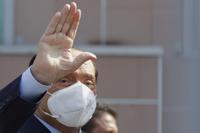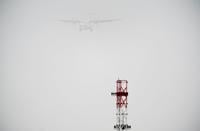More mercenaries from Russia's Wagner military contractor rolled into Belarus on Monday, a monitoring group said, continuing their relocation to the ex-Soviet nation following last month's short-lived mutiny.
Belaruski Hajun, a Belarusian activist group that monitors troops movements in Belarus, said that a convoy of more than 100 vehicles carrying Russian flags and Wagner insignia entered the country, heading toward a field camp that Belarusian authorities had offered to the company. The convoy included heavy trucks and trailers with construction equipment, among other vehicles.
The group said it was the third Wagner convoy to enter the country
A messaging app channel linked to the contractor ran a video on Monday showing Russian and Wagner flags lowered at the mercenaries' main home base in Molkino in the Krasnodar region in southern Russia. The channel said that the base would fully close on July 30, and one of the mercenaries in the video declared that Wagner was moving to unspecified new locations. Wagner also has used camps in the Russia-occupied Luhansk region of Ukraine.
Belarusian President Alexander Lukashenko, who brokered a deal that ended last month's rebellion launched by Wagner chief Yevgeny Prigozhin, has said that his country's military could benefit from the mercenaries' combat experience.
On Friday, Belarusian state TV broadcast video of Wagner instructors training Belarusian territorial defense forces at a firing range in the Asipovichy region, where r is located.
Belaruski Hajun alleged last week that Prigozhin spent a night at the camp near Tsel, about 90 kilometers (about 55 miles) southeast of the capital, Minsk, and posted a photo of him in a tent.
In the revolt that started on June 23 and lasted less than 24 hours, quickly swept through the southern Russian city of Rostov-on-Don and captured the military headquarters there without firing a shot, before driving to within about 200 kilometers (125 miles) of Moscow. a “march of justice” to oust Defense Minister Sergei Shoigu and General Staff chief Gen. Valery Gerasimov, who demanded that Wagner mercenaries sign contracts with the Defense Ministry.
The mutiny faced little resistance and the mercenaries downed at least six military helicopters and a command post aircraft, killing at least 10 airmen. Prigozhin ordered his troops back to their camps after striking a deal to end the rebellion in exchange for an amnesty for him and his men, and permission to move to Belarus. The terms of the deal and Prigozhin's fate remain murky.
The Belarusian Defense Ministry didn’t say how many Wagner troops were in Belarus. Lukashenko said previously it was up to Prigozhin and Moscow to decide on a move to Belarus. The Kremlin has refrained from comment.
Russian President Vladimir Putin has declared that Wagner troops had a choice between signing contracts with the Defense Ministry, moving to Belarus or retiring from service. Putin said last week that he offered Wagner officers the option of continuing to serve as a single unit under their same commander when he met with them five days after the rebellion.
Putin’s comments appeared to reflect his efforts to secure the loyalty of Wagner mercenaries, some of the most capable Russian forces , whose revolt posed the to his 23-year rule.
The Russian Defense Ministry said last week that Wagner was completing to the Russian military, part of efforts by Russian authorities to defuse the threat posed by the mercenaries.
The Belarusian leader has rejected the allegations that Wagner's presence in Belarus could destabilize the country, but some observers noted that he would likely order the country's security agencies to maintain a close watch over the group's activities.
“Lukashenko is a very cautious politician and he would be worried about possible surprises from the Russian mercenaries, whom he would seek to control day and night,” Belarusian political analyst Valery Karbalevich said. “The Belarusian security agencies will now focus their entire potential on not allowing Wagner to have any autonomy in Belarus.”
During a meeting Monday with the country's chief prosecutor, Lukashenko spoke about the need to tighten control over the military to ensure their full compliance with the law.










































